高级英语6 unit4
高一英语 Module6 Unit Four

高一英语Module6 Unit FourGlobal warming课时安排Warming up & Pre-readingReading and comprehendingLearning about languageUsing languageLanguage pointsTeaching goals:To learn the causes and the effects of global warmingTo learn about useful words and expressionsTo grasp the grammar—how to use “it” for emphasis in a sentenceTo learn how to express agreement and disagreement, blame and complaint.To learn how to write report about saving resources and protecting the environment. Period One: Warming up & Pre-readingWarming-upLeading in by brainstormPut the students into groups of four and discuss the following questions:1. What do we use energy for?2. What are the sources of energy?3. What sources are renewable and what are non-renewable?1. (differently)Lights, heating, and all kinds of electric equipment use energy2. coal, oil, solar panels, nuclear energy, natural gas, wind power, water, plant waste, tidal energy, ect.3. fill in a form:Pre-reading1.We use much energy in our daily life, what is the effect of using energy in our world? The use of energy --- Give off carbon dioxide, other wasted gases and heat into the air The earth is becoming warmer and warmer. (global warming)Greenhouse effect2. How does a greenhouse work? The greenhouse traps the heat from the sun and keeps it from escaping, which can make it heat up and so the plants can grow throughout the cold period.3. Under this greenhouse effect, what happens?The earth is becoming warmer and warmer.non-renewable natural gas renewable the sea (tidal energy)renewable hot springs or geysers renewable plant waste (biomass energy) renewable water (hydro-electric power) non-renewable uranium (nuclear energy) Renew able /non-renewable Sources of energyPeriod Two: ReadingTopic: short passage about global warming.Leading inTo stimulate Ss’ interest in reading the text. Divide the Ss into groups of four. Discuss the following three questions.1. What is global warming?The earth is becoming warmer2. How has this come about?Human activity—burning of fossil fuelsGreenhouse effect—greenhouse gases—we need gasesHuge quantities of extra carbon dioxide3. What are the effects of global warming?The sea level to riseSevere storms, droughts, famines, the spread of diseases, and the destruction of species. Task 1: SkimmingAsk the Ss to have a quick look at the magazine article. Then encourage them to tell what they notice about how the text is organized.( Answer: It has a title; a first paragraph that is in bold; the main text; diagrams; two quotes)Task2: ScanningTo glance at the text, and answer the following questions.1. Who wrote the magazine article? What is the name of the magazine?Sophie Armstrong wrote the magazine article.The name of the magazine is Earth Care.2. What are the names of the three scientists mentioned in the article?They are Dr. Janice Foster, Charles Keeling and George Hambley.3. What do they think about global warming? Do they agree with one another?They don't agree with each other.Dr. Janice Foster thinks the effects of global warming could be very serious.George Hambley thinks global warming will be mild with few bad environmental consequences.Charles Keeling believes it is the burning of more and more fossil fuels that is resulting in a big increase in carbon dioxide.4. What are the two graphs about?Graph I shows the temperature increase of one degree Fahrenheit between 1860 to 2000.Graph 2 is about the carbon dioxide content in the atmosphere, 1957--1997.5. What is the main topic of the article?Global warming/ the warming of the earth.Task 3: Intensive readingAsk Ss to read the text carefully and sum up the main idea of each part.Part one ( para1 )Introduce a debate over the issue of global warming.Skills : Raising a questionPart two ( para2-3 )Illustrate(explain) how global warming comes about.Skills : giving examples, using graphs, explanationPart three ( para4-8 )List two different attitudes among scientists towards global warming.Skills : giving examples, making contrast (comparison)Part four ( para9 )It’s up to readers to think and decide whether people should do something about global warming or not.Skills : using a question, leaving readers to think over the issue.Task4: ListeningListen to the tape. After it, to get Ss to finish Ex2 on page 27.Task 5: DiscussionThe earth is becoming warmer, in your opinion, does it matter? If it does, as a student, what can you do about it?Period Three:Using languageStepI: Reading“ What can we do about global warming.”Leading in:Ask students to tell what can cause global warming.Present their ideas to the whole class in groups.Task1: Ask students to read the two letters and try to answer the following questions: 1. What are Ouyang Guang’s two concerns?Getting some suggestions for what he can do about global warming.As an individual, he can have no effect on environmental problems.2. Does the Earth Care agree with Ouyang Guang’s opinion that individuals can have no effect?No.Task2: Ask students to read the letters again and list Earth Care’s suggestions.Turn electrical appliances off when not using them.Don’t turn up the heat, put on more clothes.Walk or ride a bike, don’t drive.Recycle.Buy things made from recycled materials.Buy products that use less energy.Plant trees.Talk with family and friends about global warming.Task3: Ask students to discuss these questions:In what ways would you talk with your family and friends about global warming? StepII: WritingCollect information according to the students’ discussion.Get the students to organize their ideas into several sentences. Then shorten the sentences so they become phrases.Ask students to write a poster with an eye-catching heading according to the example of how to present a poster.Sample writing for a poster:Show the students some postersStepIII: ListeningLanguage points: ( Reading )1.What do you think green house gases do?本句中think后接了一个由what引导的宾语从句。
【VIP专享】高中英语选修6unit_4单元教案

Unit 4 Global warming学情分析:教材分析本单元以Global warming 为主线,旨在通过单元教学使学生经过思考、学习,认识到全球变暖的起因和它所带来的种种后果。
同时鼓励学生进一步阐述地球所面临的其它严重问题,激发学生的环保意识。
引导学生运用所学语言、句式表达自己对这些现象的看法,培养他们为自己的观点辩论的能力,并能运用所学知识写一篇有关环境问题的论文。
类别课程标准要求掌握的项目话题Global warming, pollution and the importance of protecting the earth功能句式Expressing agreement, disagreement, blame and complaint Yes, I agree with you./ Yes, I think so./ I believe that you’ve got it right.I don’t think so./ I don’t think that’s right./ I’m afraid you are wrong. I’m sorry to bring this up, but ... / I’m sorry to have to say this, but ... They shouldn’t have done it./ They are to blame./Why don’t you do something about it?/ Perhaps they should/ ought to do ...词汇本单元无写作词汇。
阅读词汇:consume, graph, random, phenomenon, subscribe, fuel, quantity, tend, per, data, catastrophe, flood, oppose, mild, consequence, state, range, glance, widespread, steady, steadily, tendency, average, existence, outer, advercate, commitment, pollution, growth, electrical, casual, motor, can, circumastance, microwave, refresh, educator, contribution, presentation, nuclear, disagreement词组come about, subscribe to, quantities of, go up, result in, even if, be opposed to…, keep on, on the whole, on behalf of , put up with, so long as, and so on语“It” used for emphasis法It is human activity that has caused this global warming.教案一Warming Up, Pre-reading and ComprehendingTeaching goals1.Enable the students to talk about different sources of energy and express their own ideas about the use of energy.2. Enable the students to talk about the causes and effects of global warming.Step1.Warming upT: As we all know, we depend on energy to do many things in our daily life. Some people even say we could do nothing without energy. Do you aggree with me ?Then where does all the energy come from? Open your books and turn to page 25. Look at the pictures on this page. They may help you find out the answers.Sample answers:Renewable Non-renewableWind power CoalSolar power Natural gas and oilHydroelectric power Nuclear powerStep 2. Pre-readingLook at the picture of greenhouse on page25.What is it in the picture?☆Discuss the pre-reading part 1and 2.(Greenhouse gases: In the atmosphere surrounding the earth there are gases, which are called “greenhouse gases”, including carbon dioxide, methane and water vapor.)☆Then what do you think greenhouse gases do?(They trap heat from the sun and therefore warm the earth.)☆One of the effects is more and more carbon dioxide is being produced, which in turn increases the speed of global warming. Does it matter? What’re your opinions? Next we’ll read an article “THE EARTH IS BECOMING WARMER — BUT DOES IT MATTER?”Step3. Comprehending☆Look at the title can you guess the main topic of the article(Global warming/ the warming of the earth)Skimming:☆ Read the passage quicklyHow many paragraphs does the reading text consist of? Please number them.According to the main idea of each part, match them in a right order.Part1 (1) Two different attitudes among scientists towards global warming.Part2 (2-5) How global warming comes about.Part3 (6) Introduce a discussion about global warming.Part4 (7) Leave us a question whether people should do something about global warming or not. ☆Can you match the logic order with each part? (Keys: BADC)A. Giving examples,using graphs, explanationB. Raising a questionC. Leaving a questionD Giving examples, making contrast☆Scanning: Finish the exercises 1(1,2) and 2(True or false)教案二Language points1. So how has this come about and does it matter?Can you tell me how the accident came about?With the use of electricity, great changes have come about.总结:come about发生, 造成, 相当于happen/take place/ occur to是不及物短语。
人教版高二英语选修六第四单元课文预习PPT课件
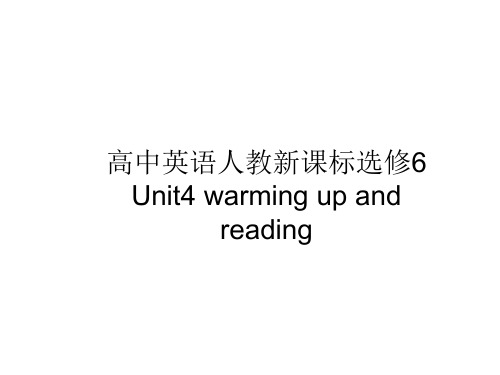
The Earth Is BeБайду номын сангаасoming Warmer
– But Does It Matter?
Fast Reading
Glance at the article and answer the question.
What is the structure of a magazine like this and how is the text organized?
The Hydro- are used to keep back electric dams water and raise its level
for irrigation or for producing electricity, etc.
Uranium Ore (铀矿石)
The element uranium does not occur in pure form in nature but is found in minerals such as
The Oil Refineries
A nuclear power plant
a facility designed to convert nuclear energy into electricity.
Solar panels
on the roof of a house on a bright sunny day are used to collect solar energy, making your house warm or heating your water.
Greenhouse gases!
What’s greenhouse gases effect?
Greenhouse gases perform the same function as the glass in a greenhouse --- They trap the heat of the sun and keep the air surrounding the earth warm. It is called the greenhouse effect.
人教版高中英语选修六:Unit4教案+
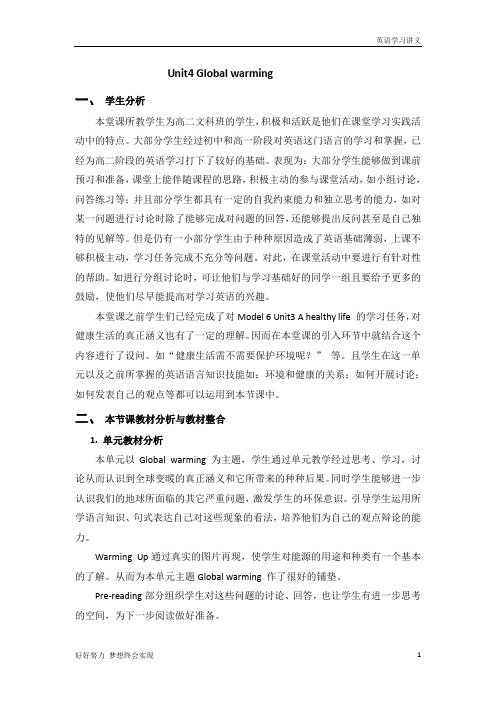
Unit4 Global warming一、学生分析本堂课所教学生为高二文科班的学生,积极和活跃是他们在课堂学习实践活动中的特点。
大部分学生经过初中和高一阶段对英语这门语言的学习和掌握,已经为高二阶段的英语学习打下了较好的基础。
表现为:大部分学生能够做到课前预习和准备,课堂上能伴随课程的思路,积极主动的参与课堂活动,如小组讨论,问答练习等;并且部分学生都具有一定的自我约束能力和独立思考的能力,如对某一问题进行讨论时除了能够完成对问题的回答,还能够提出反问甚至是自己独特的见解等。
但是仍有一小部分学生由于种种原因造成了英语基础薄弱,上课不够积极主动,学习任务完成不充分等问题。
对此,在课堂活动中要进行有针对性的帮助。
如进行分组讨论时,可让他们与学习基础好的同学一组且要给予更多的鼓励,使他们尽早能提高对学习英语的兴趣。
本堂课之前学生们已经完成了对Model 6 Unit3 A healthy life 的学习任务,对健康生活的真正涵义也有了一定的理解。
因而在本堂课的引入环节中就结合这个内容进行了设问。
如“健康生活需不需要保护环境呢?”等。
且学生在这一单元以及之前所掌握的英语语言知识技能如:环境和健康的关系;如何开展讨论;如何发表自己的观点等都可以运用到本节课中。
二、本节课教材分析与教材整合1. 单元教材分析本单元以Global warming 为主题,学生通过单元教学经过思考、学习,讨论从而认识到全球变暖的真正涵义和它所带来的种种后果。
同时学生能够进一步认识我们的地球所面临的其它严重问题,激发学生的环保意识。
引导学生运用所学语言知识、句式表达自己对这些现象的看法,培养他们为自己的观点辩论的能力。
Warming Up通过真实的图片再现,使学生对能源的用途和种类有一个基本的了解。
从而为本单元主题Global warming 作了很好的铺垫。
Pre-reading部分组织学生对这些问题的讨论、回答,也让学生有进一步思考的空间,为下一步阅读做好准备。
人教版高级高中英语选修六unit4课件
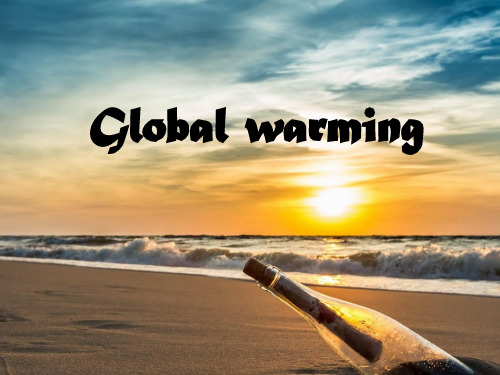
4 . It
means
that
more
heat
energy
tends
to
________________ (困在) the atmosphere ________ (从而引起) the global temperature to go up.
[答案] be trapped in;
1.consume v.(P25)消费;消耗 [一句背诵] The air conditioners of this type consume too
[答案] 他有自私自利的倾向。
②She tends to get angry when others disagree with her. ______________________________________________
[答案] 别人不同意她的看法时,她很容易生气。
③You'd better tend to your own affairs. ______________________________________________
6.__________ n. 环境;情况 [答案] circumstance
Ⅱ.联想填读 1.______________发生→come out出版→come up(问题) 被提出→______________提出→__________________偶遇
[答案] come about;come up with;come across
[答案] subscribe
2.__________ n.量;数量 [答案] quantity 3.__________ vt. 陈述;说明 [答案] state
4.__________ vi. 看一下;扫视 [答案] glance 5.__________ adj. 平均的
人教版高中英语必修六Unit4 Global warming课文全解

人教版高中英语必修六Unit4 Global warming课文全解(常考单词、高频短语和写作句式)Ⅰ. 常考单词必背1.consume vt. 消耗,消费;挥霍vi. 耗尽,毁灭Consumer goods production was to go up by six percent in that city. 在那个城市,消费品生产将增长百分之六。
2.random n. 偶然/随便的行动 adj. 任意的;随便的;任意的 adv.胡乱地[快速闪记]at random 随便地Because these natural disasters occur at random times,it is difficult to warn people in advance. 自然灾害的发生具有随机性,所以很难事先警告人们。
3.subscribe vt.&vi.(常与to连用) ①捐(款);捐助②订购(报纸等) ③同意;赞同I subscribe to a few favourite charities. 我定期向几个中意的慈善机构捐款。
I've personally never subscribed to the view that either sex is superior to the other. 我个人从来都不同意性别有优劣之分的观点。
4.quantity n. 量;数量The change of quantity causes the change of quality. 量变引起质变。
[快速闪记]a large quantity of/large quantities of 大量in quantity/in large quantities 大量地5.trend n. 趋势;倾向But recently,we have seen a gradual trend towards healthier food. 但是近来,我们注意到人们逐渐倾向于更加健康的食品。
高级英语6课件unit04TOP01
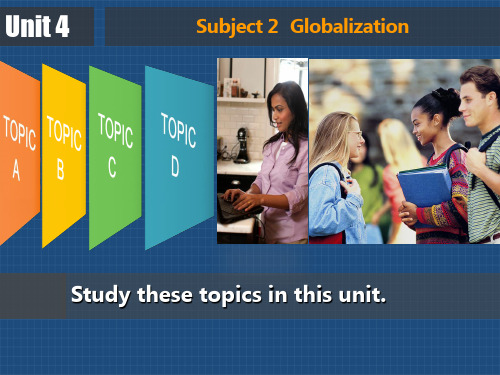
Unit Project
PRE
Topic A The Cold War and Globalization NEXT
CON
Reading: International Relations: The Cold War and Globalization1
A professor is presenting a lecture on international relations. Before you read, complete the pre-reading tasks in small groups.
autarky
It refers to the period from 1967 to 1979 when the Soviet Union and the US, the two superpowers, had an easing of their tቤተ መጻሕፍቲ ባይዱnsions.
Keys
PRE
A Topic A The Cold War and Globalization NEXT CON
Discuss these questions in small groups before you read.
1. How much do you know about the Cold War? When did it happen? Who were involved? 2. How did the Cold War affect the international relations? How were the world divided during the Cold War era?
Q Topic A The Cold War and Globalization
人教版高英选修6重点单词和短语讲解 unit4

1. phenomenon n. 現象;奇迹,罕见的人才或事物phenomena(pl.)Rain and snow are phenomena of the weather.Beethoven was a phenomenon among musicians.the phenomena of nature 自然现象a social phenomenon 社会现象It is a social phenomenon that teenagers addict themselves to computer games.【2019北京】At the heart of the phenomenon lie tiny marine microorganisms(海洋微生物)called phytoplankton.【2015北京】This phenomenon is neither good nor bad; it is a fact of college life, today and in the past.【期末测试】The top leaders of the two countries are holding talks in a friendly_________.A.atmosphereB. stateC. situationD. phenomenon2.tend1)vt. 趋向, 往往是;Most of boys tend to enjoy playing basketball. tend to do倾向于做;有..的习惯The older women tend to believe in strangers easily.2)vi.照管, 护理常与on/upon/to连用His mother was ill and he had to tend to her.tend on/upon the customer 招待客人tendency n. 趋向,倾向(常与to/towards连用)Nowadays there is a growing tendency for people to shop on internet.【2019天津】Those who tend to think back can hardly go ahead.【2016四川】 Some think that a woman’s body cells have a tendency to age more slowly than a man’s.3. range n.行列, 范围;vt. 排列, 归类于We have a wide range of choices such as travelling and visiting friends.a (wide) range of ...一系列…In spite of the simple language, this article is beyond the range of human understanding.beyond/out of range 在范围外The price of this house is out of our range. beyond/out of one's range 某人能力达不到的Prices range between 7 and 10. range between ... and ...在……和……范围内变动He has a number of interests, which range from playing chess to swimming.range from ... to ... 在……范围内变动【2018江苏】But those who truly understand the economic impact and can work to change the patternscan create a wide range of career possibilities.【期末测试】The national park has a large collection of wildlife, _________ from butterflies to elephants.A. rangingB. rangeC. to rangeD. ranged4. average1) adj.平均的;一般的,普通的,中等的That was too expensive for the average American family.(07江苏阅读E)The average women’s brain weighs 10% less than men’s.(08陕西阅读E)2)n.平均,平均数I spend an average of about $200 a year on books. an average of 平均有(后跟数词)The average of 3, 8 and 10 is 7. the average of ……的平均数The common cold is a good example: women, on average, get fewer colds than men.on (the) average 平均起来above/below (the) average在平均水平以上/以下up to (the) average达到平均水平【2019江苏】Mammals(哺乳动物)weighing sixty kilograms have an average brain size of 200 cm2. 【2017全国卷Ⅱ】Freddy was an average student, but not an average person.【期末测试】Last year the number of students who graduated with a driving licence reached 200,000, a(n) of 40,000 per year.A. averageB. numberC. amountD. quantity5.existence n.生存In the middle age, almost everybody tended to believe the existence of God.The elephant is the largest land animal in existence. in existence存在的;现存的exist v.存在Man cannot exist without air.【2019北京】A lot of business is still done over the phone, and much of it is based on trust and existing relationships.【2016全国3】it can be quite an eye opener to see the range of classical apples still in existence【高考完形】54.A. vary B. arise C. spread D. existe about 发生How did this come about?I don't know how it came about but I've got a dent in the rear of my car.[短语拓展]come along 进展;同…一起His work is coming along well.他的工作进展情况很好。
选修6unit4 知识点讲解
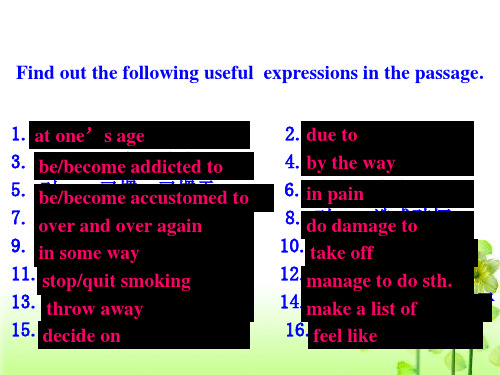
顺便说
用这种方法
by the way
in this way
在……途中
一路上,始终 在某种程度上
on the way
all the way in a way
挡道,妨碍
in the way
By ____ the _____, way do you have any 1. ____ idea where the post office is? 2. The children have some candy to eat ___ on ____ the ____ way home. 3. They were singing ___ all ___ the _____. way
2. due 因为,由于 to 4. by 顺便说一下 the way 6. in 痛苦,疼痛 pain 8. do 对„„造成破坏 damage to 10. take 使离开,调离 off 12.manage 设法成功做某事 to do sth. 14.make 列出一张 单子 a list ...... of 16.feel 喜欢 ....... like
我也不知道,我自己吸烟还会危害那 些不吸烟人的健康。
句中的neither是代词,代替上句中的某 成分,表示前面说的情况同样不适用于 另一件事或人;助动词、系动词或情态 主语 保持数的一致。如果 动词必须与 _____ 表示肯定,适用,则用 ________________________________ so+ 助动词 / 情态动词 / 系动词+ing that at my age I am still fit enough to cycle 20 kilometers in an afternoon. 令人吃惊的是,像我这样的年纪,身体 健康而且能在一个下午骑车跑20公里。
人教版高中英语选修六Unit-4--Reading

Illustrate how global warming comes about.
. 2-5
An introduction of the passage
返回
返回
Listen, read and think
Part 1:Para 1
1.Who wrote the magazine article? → Sophie Armstrong
D.global warming will go on
E.puzzles about global warming F.different attitudes to global warming
Para. 7 G. an introduction to the passage
返回
The structure of the passage
返回
What should we do to stop global warming?
返回
.
.
Try to reduce the use of motor vehicles
返回
bike
running
返回
Planting trees Cleaning the
rubbish
返回
Assignment
1. Write an argumentation titled “Environment Protection ”based on the viewpoints in the text and yours. 2. Preview the language points in the text and find out your difficult points.
could be _v_e_r_y_s_e_r_io_u_s_. _a_n_im__a_l_s____.
高中英语人教版选修六Unit4精读课文逐句翻译

高中英语人教版选修六Unit4精读课文逐句翻译选修六Unit4 THE EARTH IS BECOMING W ARMER-BUT DOES IT MATTER?全球在变暖——这会带来什么影响吗?During the 20th century the temperature of the earth rose about one degree Fahrenheit.在20世纪期间,地球温度大约升了华氏1度。
That probably does not seem much to you or me, but it is a rapid increase when compared to other natural changes.这个数值对你我来说很可能是无所谓的,但是跟其他自然变化相比较而言,这却是一种快速的增长。
So how has this come about and does it matter?那么,这种温度的增长是怎么产生的呢?会产生什么影响呢?Earth Care’s Sophie Armstrong explores these questions. “关爱地球”组织的索菲·阿姆斯特朗就在探究这些问题。
There is no doubt that the earth is becoming warmer (see Graph 1) and that it is human activity that has caused this global warming rather than a random but natural phenomenon.毫无疑问,地球是在变暖(见表一,略),而地球变暖正是人类活动导致而成的,并非是一种无规律的自然现象。
All scientists subscribe to the view that the increase in the earth's temperature is due to the burning of fossil fuels like coal, natural gas and oil to produce energy.所有的科学家赞同这种观点:人们为了生产能量而燃烧化石燃料(如煤、天然气和石油等),从而引起了地球温度的升高。
人教版高中英语选修六book6unit4reading40页

What is it used for?
A greenhouse
精编优质 课PPT人 教版高 中英语 选修六 book6u nit4re ading (共40 张PPT) (获奖 课件推 荐下载)
精编优质 课PPT人 教版高 中英语 选修六 book6u nit4re ading (共40 张PPT) (获奖 课件推 荐下载)
精编优质 课PPT人 教版高 中英语 选修六 book6u nit4re ading (共40 张PPT) (获奖 课件推 荐下载)
2. How does the greenhouse work?
精编优质 课PPT人 教版高 中英语 选修六 book6u nit4re ading (共40 张PPT) (获奖 课件推 荐下载)
A greenhouse is made of __g_la_s_s_ and is used for _g_r_o_w__in_g__p_la_n_t_s_, especially during _c_o_l_d_weather.
精编优质 课PPT人 教版高 中英语 选修六 book6u nit4re ading (共40 张PPT) (获奖 课件推 荐下载)
coal power stations Walk or ride a bike, don’t drive.
Who wrote the article? 精编优质课PPT人教版高中英语选修六book6unit4reading(共40张PPT)(获奖课件推荐下载) Coal oil wind sun nuclear water underground 精编优质课PPT人教版高中英语选修六book6unit4reading(共40张PPT)(获奖课件推荐下载) THE EARTH IS BECOMING WARMER
人教课标版高中英语选修6 Unit4_Reading_词汇导图语境速记

trend n. 走向;趋势;倾向
trend
trendy adj. 时髦的;赶时髦的
tend 和trend tend v. 易于;倾向 She tends to get angry if you annoy her.如果你使她烦恼,她容易发火。 trend n. 趋势;倾向 There is a trend towards simple styles in women's dress.女装款式有向简朴 发展的趋势。
漫画助记
He wants to figure out the quantity of ducklings. 他想搞清楚小鸭子的数量。
tend vi. 趋向;易于;照顾vt.照顾;护理
tend to do sth. 易于/往往会做某事
tend towards sth. 有……的趋势;倾向于……
tend
漫画助记
The trend of prices is still upwards. 物价的趋向是仍在上涨。
oppose vt. 反对;反抗;与(某人)较量 be opposed to opposed adj. 反对的;对立的
be opposed to 反对……
(1)be opposed to结构中,to 是介词,其后要用v.-ing形式。 (2)表示“反对”的其他表达:disagree with; object to; against等。
They consumed all the hot dogs and hamburgers. 他们把热狗和汉堡包统统吃光了。
漫画助记
He consumes much of his spare time in studying. 他把很多的课余时间都用在学习上。
高级英语6 unit4
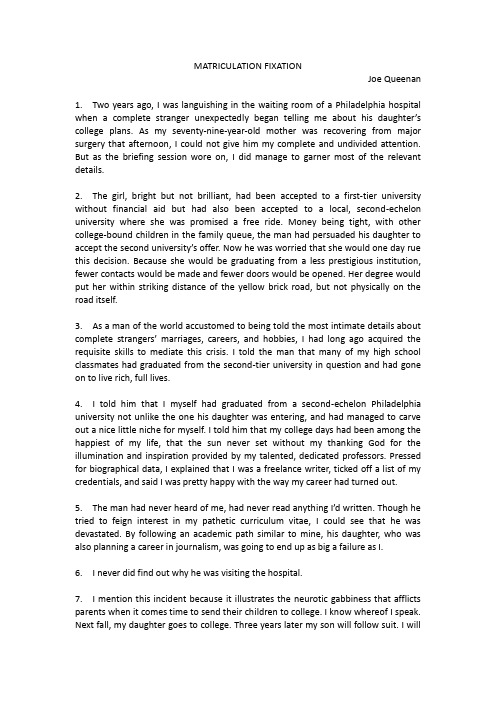
MATRICULATION FIXATIONJoe Queenan1. Two years ago, I was languishing in the waiting room of a Philadelphia hospital when a complete stranger unexpectedly began telling me about his daughter’s college plans. As my seventy-nine-year-old mother was recovering from major surgery that afternoon, I could not give him my complete and undivided attention. But as the briefing session wore on, I did manage to garner most of the relevant details.2. The girl, bright but not brilliant, had been accepted to a first-tier university without financial aid but had also been accepted to a local, second-echelon university where she was promised a free ride. Money being tight, with other college-bound children in the family queue, the man had persuaded his daughter to accep t the second university’s offer. Now he was worried that she would one day rue this decision. Because she would be graduating from a less prestigious institution, fewer contacts would be made and fewer doors would be opened. Her degree would put her within striking distance of the yellow brick road, but not physically on the road itself.3. As a man of the world accustomed to being told the most intimate details about complete strangers’ marriages, careers, and hobbies, I had long ago acquired the requisite skills to mediate this crisis. I told the man that many of my high school classmates had graduated from the second-tier university in question and had gone on to live rich, full lives.4. I told him that I myself had graduated from a second-echelon Philadelphia university not unlike the one his daughter was entering, and had managed to carve out a nice little niche for myself. I told him that my college days had been among the happiest of my life, that the sun never set without my thanking God for the illumination and inspiration provided by my talented, dedicated professors. Pressed for biographical data, I explained that I was a freelance writer, ticked off a list of my credentials, and said I was pretty happy with the way my career had turned out.5. The man had never heard of me, had never read anything I’d written. Though he tried to feign interest in my pathetic curriculum vitae, I could see that he was devastated. By following an academic path similar to mine, his daughter, who was also planning a career in journalism, was going to end up as big a failure as I.6. I never did find out why he was visiting the hospital.7. I mention this incident because it illustrates the neurotic gabbiness that afflicts parents when it comes time to send their children to college. I know whereof I speak. Next fall, my daughter goes to college. Three years later my son will follow suit. I willbe sorry to see them go; over the years they have proved to be remarkably amusing. But every dark cloud has a silver lining. Once my children have left the house, I will never again have to participate in a mind-numbing discussion about where my children or my friends’ children or my neighbors’ children are going to college, and why. On this subject, I am completely lapped out.8. This lack of interest does not stem from pure selfishness or unalloyed contempt for other people’s offspring. Rather, I feel this way because I find almost all conversations about the college selection process to be banal, self-aggrandizing, self-fl agellatory, or punitive. I’d rather talk about cribbage.9. The most infuriating conversation is the one where the parent clearly seeks a decisive, career-validating moment of emotional closure. Such individuals believe that securing admission to a top-flight university provides a child with an irrevocable passport to success, guaranteeing a life of uninterrupted economic mirth. Parents such as these upwardly mobile chuckleheads exude an almost Prussian3 belligerence when announcing their children’s destin ations, congratulating themselves on a job well done, while issuing a sotto voce taunt to parents of the less gifted. For them, the hard part of child rearing is now over. Junior went to the right prep, made the right friends, signed up for the right activities, and is now headed for the right school. Now we can get the heck out of here and move to Tuscany.10. But in reality, life doesn’t end at age seventeen. Or twenty-one! In real life, some children get the finest educations but still become first-class screwups. My own profession is filled with people who went to the right school but ended up in the wrong career. Some of those boys and girls most likely to succeed are going to end up on welfare or skid row. At which point they’ll need parental input. Or cash. A parent’s responsibility doesn’t end once the kids leave. A parent’s responsibility never ends. That’s why Nature gives you the job.411. A second, far more numerous class of obsessives consists of people who suddenly realize that their Brand X children aren’t going to make the cut. Seventeen years of unread textbooks, unvisited museums, and untaken AP courses are now finally taking their toll, and those grandiose delivery-room dreams of Amherst5, Bard6, and Duke7 are suddenly going up in smoke. Bashfully, shamefacedly, miserably, these parents now mumble the names of the glamourless institutions their progeny are skulking off to. Invariably, they are colleges you never heard of in towns no one wants to visit in states whose capitals only repeat winners on Jeopardy!8 can name. The market has spoken, the glum parental expressions seem to say. My child is an idiot.12. But once again, reality has a way of upsetting the worst-laid plans of mice and Mensa9. Some kids are late bloomers. Some kids are better off in a less competitive environment. Lots of people achieve huge success in this society without a degreefrom a prestigious university. Just because your child has failed to clear the first, or even the twentieth, hurdle doesn’t mean you should disown him. Matisse didn’t get rolling until he was in his forties.10 Bill Gates11, David Geffen12, Michael Dell13, Graydon Carter14, and adonna15 are all college dropouts. Ronald Reagan16 attended tiny Eureka college, while Warren Buffet17 went to Football U in Lincoln, Nebraska. Despite what you may have read in F. Scott Fitzgerald18 (who dropped out of Princeton in 1917), life doesn’t have just one act.19 There is often Act Two. And Act Five. Not to mention the sequels. Matriculation fixation reaches its dottiest form during the obligatory campus visit. Here it is never entirely clear what parents are looking for, particularly in high-profile institutions whose renown has in some way preceded them. During a recent visit to MIT, I watched the first thirty seconds of an admissions office video poking fun at the university’s reputation as a nerd factory. While my wife and daughter watched the rest of the video, which assured applicants that MIT nerds were hard to find, I took a stroll around the campus. I saw a lot of nerds. And I do not mean this as a criticism.13. Later that morning, a guide showed a bunch of us around the campus. At one juncture, she pointed out a restaurant where students could grab a fast, inexpensive meal. “How much?” asked one high-str ung mother. “About eight bucks,” she was told. The woman shuddered, noting that forking over eight dollars for dinner every night could get pretty darned expensive.14. “It’s going to cost you forty grand to send your kid to school here,” I interjected. “Don’t start worrying about dinner prices.”15. Since that visit this fall, this incident has become an invaluable part of my repertory. Now, whenever I am dragooned into the 30,000th interminable conversation about the college selection process, I indicate that sedulous monitoring of on-campus restaurant prices should be a vital component of the winnowing procedure, particularly vis-à-vis panini. People who hear me say things like this can’t decide whether I am insensitive or ornery or flat-out dumb. Well, let’s just put it this way: I was never MIT material.1. 两年前的一天,我坐在费城一所医院的大厅里焦急地等待着,一位素不相识的人突然向我讲述了他女儿的大学就读计划。
高级英语6课件unit04TOP02

数字化 转承包商 金融等保险业 投资安全等级
股票化 投资组合
资产
PRE
Topic B NEXT
Reading: Three Fundamental Changes
CON
The Democratization of Technology
The innovations in computerization, miniaturization, telecommunications and digitization have made it possible for hundreds of millions of people around the world to get connected and exchange information, news, knowledge, money, family photos, financial trades, music or television shows in ways, and to a degree, never witnessed before. Former NBC News president Lawrence Grossman neatly sums up this change: “Printing,” he says, “made us all readers. Xeroxing made us all publishers. Television made us all viewers. Digitization makes us all broadcasters.”
CON
eras. Put simply, this democratization of technology “globalizes production.” Today, we can all be producers. Today’s globalization isn’t just about developing countries shipping raw materials to developed ones, letting them produce the finished goods, and then shipping them back. No, today, thanks to the democratization of technology, all sorts of countries have the opportunity to assemble the technologies, raw materials and funding to be producers, or subcontractors, of highly complex finished products or services, and this becomes another subtle factor knitting the world more tightly together. This democratization of technology is how Thailand, in fifteen years, went from being a primarily rice-producing country to being the world’s second-largest producer of pickup trucks, rivaling Detroit, and the fourth-largest maker of
高中英语必修6Unit 4 Helping people around the world--Pro
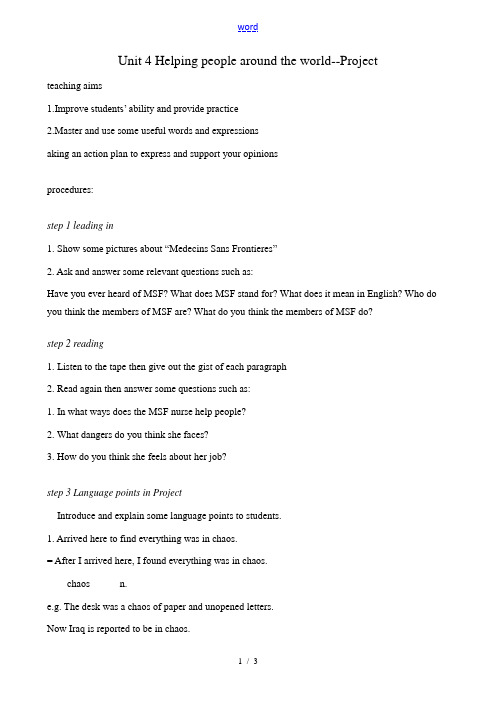
Unit 4 Helping people around the world--Projectteaching aims1.Improve students’ ability and provide practice2.Master and use some useful words and expressionsaking an action plan to express and support your opinionsprocedures:step 1 leading in1. Show some pictures about “Medecins Sans Frontieres”2. Ask and answer some relevant questions such as:Have you ever heard of MSF? What does MSF stand for? What does it mean in English? Who do you think the members of MSF are? What do you think the members of MSF do?step 2 reading1. Listen to the tape then give out the gist of each paragraph2. Read again then answer some questions such as:1. In what ways does the MSF nurse help people?2. What dangers do you think she faces?3. How do you think she feels about her job?step 3 Language points in ProjectIntroduce and explain some language points to students.1. Arrived here to find everything was in chaos.= After I arrived here, I found everything was in chaos.chaos n.e.g. The desk was a chaos of paper and unopened letters.Now Iraq is reported to be in chaos.2. Many of the people have fled to the mountains to escape the floods.flee vi./vt.e.g. During the war many people in the village fled to neighboring countries.Last night many tourists fled the burning hotel.3. We also had a vaccination campaign to stop children dying from measles.die frome.g. The soldiers died from a wound.die of 死于…(强调内因) die out 绝种die off 一个个死掉die down/away 平息die for sth./to do sth. 迫切要做某事e.g. I am dying for a cup of tea. / I am dying to drink a cup of tea.The fire is dying down. Please put more coal.4. Meanwhile, in the rest of the city, shelter and access to food and clean water are big problems. access (to) [U] n.e.g. Access to the little village is across a small bridge.The only access to the school is a muddy road.Only a few people have access to the full facts of the case.accessible adj.Medicine should not be kept where it is accessible to children.5. It reminded me of my time in Sudan, …remind v.The photo reminds me of the days when I stayed with my students. (remind sb. of sth.)The sight of clock reminded me that I was late. (remind sb. that…)remind v.It is so kind of you to remind me of the interview with Mr. Li. (remind sb. of sth.)The tourists are reminded that they must e back to the park gate at 3 pm. (remind sb. that…) The teacher reminded the students to review the lessons for the ing exam. (remind sb. to do sth.)6. …I can help here and there, and make a difference to people’s lives …make a difference (to)I admit that makes a difference to me.step 4 Group discussionDivide the students into different groups and set a topic for discussion.Topic: Imagine that you will work in your munity and help old people and children there. What will and can you do for them? Discuss the topic with your group members and work out an action plan. Then ask every group to write a plan about what they are going to do and how to put them into action.Ask each group to present their plan to the whole class.HomeworkFinish Parts D1 and D2 on page 127 in Workbook.。
高中英语课件-boo6 unit 4

Every time I walk along the Ganjiang River, I can see huge quantities of rubbish such as plastic bags, litter, fruit peels and so on floating on the river. There is no denying that it is the rubbish that results in the dirty water in the Ganjiang River. As we can see, many people keep on throwing rubbish, so I wonder how this sort of habit come about? On the whole, I am strongly opposed and can't put up with the behavior of this kind, for we have to be aware the fact that the earth is facing global warming as a consequence of pollution. On behalf of those who take good care of our environment, I would like to say we can create a beautiful environment as long as we can behave ourselves.
• The two residential towers host 900 trees and over 20,000 plants from __a__ wide range of shrubs(灌木) and floral(花的) plants. On flat land, each vertical forest equals an area of 7,000 square meters of forest area.
高一英语 Module6 Unit Four

高一英语Module6 Unit FourGlobal warming课时安排Warming up & Pre-readingReading and comprehendingLearning about languageUsing languageLanguage pointsTeaching goals:To learn the causes and the effects of global warmingTo learn about useful words and expressionsTo grasp the grammar—how to use “it〞for emphasis in a sentenceTo learn how to express agreement and disagreement, blame and complaint.To learn how to write report about saving resources and protecting the environment. Period One: Warming up & Pre-readingWarming-upLeading in by brainstormPut the students into groupsof four and discuss the following questions:1. What do we use energy for?2. What are the sources of energy?3. What sources are renewable and what are non-renewable?1. (differently)Lights, heating, and all kinds of electric equipment use energy2. coal, oil, solar panels, nuclear energy, natural gas, wind power, water, plant waste, tidal energy, ect.3. fill in a form:Pre-reading1.We use much energy in our daily life, what is the effect of using energy in our world? The use of energy --- Give off carbon dioxide, other wasted gases and heat into the air The earth is becoming warmer and warmer.(global warming)Greenhouseeffect2. How does a greenhouse work? The greenhouse traps the heat from the sun and keeps it from escaping, which can make it heat up and so the plants can grow throughout the cold period.3. Under this greenhouse effect, what happens?The earth is becoming warmer and warmer.non-renewable natural gas renewable the sea (tidal energy)renewable hot springs or geysers renewable plant waste (biomass energy) renewable water (hydro-electric power) non-renewable uranium (nuclear energy) Renew able /non-renewable Sources of energyPeriod Two: ReadingTopic: short passage about global warming.Leading inTo stimulate Ss’ interest in reading the text. Divide the Ss into groups of four. Discuss the following three questions.1. What is global warming?The earth is becoming warmer2. How has this come about?Human activity—burning of fossil fuelsGreenhouse effect—greenhouse gases—we need gasesHuge quantities of extra carbon dioxide3. What are the effects of global warming?The sea level to riseSevere storms, droughts, famines, the spread of diseases, and the destruction of species. Task 1: SkimmingAsk the Ss to have a quick look at the magazine article. Then encourage them to tell what they notice about how the text is organized.( Answer: It has a title; a first paragraph that is in bold; the main text; diagrams; two quotes)Task2: ScanningTo glance at the text, and answer the following questions.1. Who wrote the magazine article? What is the name of the magazine?Sophie Armstrong wrote the magazine article.The name of the magazine is Earth Care.2. What are the names of the three scientists mentioned in the article?They are Dr. Janice Foster, Charles Keeling and George Hambley.3. What do they think about global warming? Do they agree with one another?They don't agree with each other.Dr. Janice Foster thinks the effects of global warming could be very serious.George Hambley thinks global warming will be mild with few bad environmental consequences.Charles Keeling believes it is the burning of more and more fossil fuels that is resulting in a big increase in carbon dioxide.4. What are the two graphs about?Graph I shows the temperature increase of one degree Fahrenheit between 1860 to 2000.Graph 2 is about the carbon dioxide content in the atmosphere, 1957--1997.5. What is the main topic of the article?Global warming/ the warming of the earth.Task 3: Intensive readingAsk Ss to read the text carefully and sum up the main idea of each part.Part one ( para1 )Introduce a debate over the issue of global warming.Skills : Raising a questionPart two ( para2-3 )Illustrate(explain) how global warming comes about.Skills : giving examples, using graphs, explanationPart three ( para4-8 )List two different attitudes among scientists towards global warming.Skills : giving examples, making contrast (comparison)Part four ( para9 )It’s up to readers to think and decide whether people should do something about global warming or not.Skills : using a question, leaving readers to think over the issue.Task4: ListeningListen to the tape. After it, to get Ss to finish Ex2 on page 27.Task 5: DiscussionThe earth is becoming warmer, in your opinion, does it matter? If it does, as a student, what can you do about it?Period Three:Using languageStepI: Reading“ What can we do about global warming.〞Leading in:Ask students to tell what can cause global warming.Present their ideas to the whole class in groups.Task1: Ask students to read the two letters and try to answer the following questions: 1. What are Ouyang Guang’s two concerns?Getting some suggestions for what he can do about global warming.As an individual, he can have no effect on environmental problems.2. Does the Earth Care agree with Ouyang Guang’s opinion that individuals can have no effect?No.Task2: Ask students to read the letters again and list Earth Care’s suggestions.Turn electrical appliances off when not using them.Don’t turn up the heat, put on more clothes.Walk or ride a bike, don’t drive.Recycle.Buy things made from recycled materials.Buy products that use less energy.Plant trees.Talk with family and friends about global warming.Task3: Ask students to discuss these questions:In what ways would you talk with your family and friends about global warming? StepII: WritingCollect information according to the students’ discussion.Get the students to organize their ideas into several sentences. Then shorten the sentences so they become phrases.Ask students to write a poster with an eye-catching heading according to the example of how to present a poster.Sample writing for a poster:Show the students some postersStepIII: ListeningLanguage points: ( Reading )1.What do you think green house gases do?本句中think后接了一个由what引导的宾语从句。
人教版高中英语选修六Book6Unit4SentenceExplanation
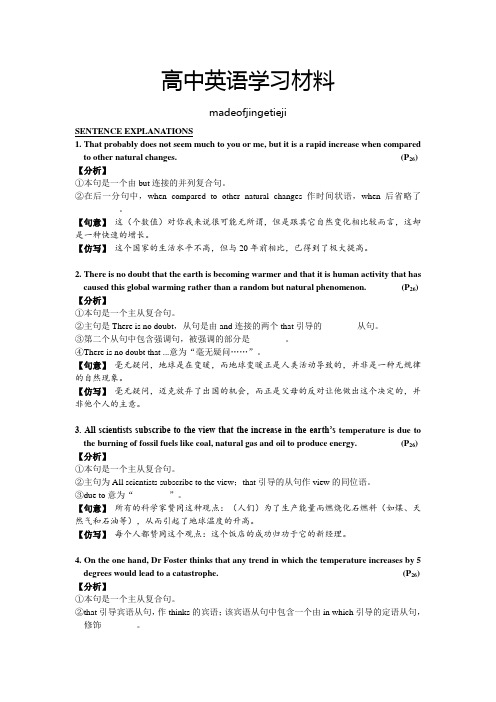
高中英语学习材料madeofjingetiejiSENTENCE EXPLANATIONS1. That probably does not seem much to you or me, but it is a rapid increase when compared to other natural changes. (P26)【分析】①本句是一个由but连接的并列复合句。
②在后一分句中,when compared to other natural changes作时间状语,when后省略了________。
【句意】这(个数值)对你我来说很可能无所谓,但是跟其它自然变化相比较而言,这却是一种快速的增长。
【仿写】这个国家的生活水平不高,但与20年前相比,已得到了极大提高。
____________________________________________________________2. There is no doubt that the earth is becoming warmer and that it is human activity that has caused this global warming rather than a random but natural phenomenon. (P26)【分析】①本句是一个主从复合句。
②主句是There is no doubt,从句是由and连接的两个that引导的________从句。
③第二个从句中包含强调句,被强调的部分是________。
④There is no doubt that ...意为“毫无疑问……”。
【句意】毫无疑问,地球是在变暖,而地球变暖正是人类活动导致的,并非是一种无规律的自然现象。
【仿写】毫无疑问,迈克放弃了出国的机会,而正是父母的反对让他做出这个决定的,并非他个人的主意。
____________________________________________________________3. All scientists subscribe to the view that the increase in the earth’s temperature is due to the burning of fossil fuels like coal, natural gas and oil to produce energy. (P26)【分析】①本句是一个主从复合句。
- 1、下载文档前请自行甄别文档内容的完整性,平台不提供额外的编辑、内容补充、找答案等附加服务。
- 2、"仅部分预览"的文档,不可在线预览部分如存在完整性等问题,可反馈申请退款(可完整预览的文档不适用该条件!)。
- 3、如文档侵犯您的权益,请联系客服反馈,我们会尽快为您处理(人工客服工作时间:9:00-18:30)。
MATRICULATION FIXATIONJoe Queenan1. Two years ago, I was languishing in the waiting room of a Philadelphia hospital when a complete stranger unexpectedly began telling me about his daughter’s college plans. As my seventy-nine-year-old mother was recovering from major surgery that afternoon, I could not give him my complete and undivided attention. But as the briefing session wore on, I did manage to garner most of the relevant details.2. The girl, bright but not brilliant, had been accepted to a first-tier university without financial aid but had also been accepted to a local, second-echelon university where she was promised a free ride. Money being tight, with other college-bound children in the family queue, the man had persuaded his daughter to accep t the second university’s offer. Now he was worried that she would one day rue this decision. Because she would be graduating from a less prestigious institution, fewer contacts would be made and fewer doors would be opened. Her degree would put her within striking distance of the yellow brick road, but not physically on the road itself.3. As a man of the world accustomed to being told the most intimate details about complete strangers’ marriages, careers, and hobbies, I had long ago acquired the requisite skills to mediate this crisis. I told the man that many of my high school classmates had graduated from the second-tier university in question and had gone on to live rich, full lives.4. I told him that I myself had graduated from a second-echelon Philadelphia university not unlike the one his daughter was entering, and had managed to carve out a nice little niche for myself. I told him that my college days had been among the happiest of my life, that the sun never set without my thanking God for the illumination and inspiration provided by my talented, dedicated professors. Pressed for biographical data, I explained that I was a freelance writer, ticked off a list of my credentials, and said I was pretty happy with the way my career had turned out.5. The man had never heard of me, had never read anything I’d written. Though he tried to feign interest in my pathetic curriculum vitae, I could see that he was devastated. By following an academic path similar to mine, his daughter, who was also planning a career in journalism, was going to end up as big a failure as I.6. I never did find out why he was visiting the hospital.7. I mention this incident because it illustrates the neurotic gabbiness that afflicts parents when it comes time to send their children to college. I know whereof I speak. Next fall, my daughter goes to college. Three years later my son will follow suit. I willbe sorry to see them go; over the years they have proved to be remarkably amusing. But every dark cloud has a silver lining. Once my children have left the house, I will never again have to participate in a mind-numbing discussion about where my children or my friends’ children or my neighbors’ children are going to college, and why. On this subject, I am completely lapped out.8. This lack of interest does not stem from pure selfishness or unalloyed contempt for other people’s offspring. Rather, I feel this way because I find almost all conversations about the college selection process to be banal, self-aggrandizing, self-fl agellatory, or punitive. I’d rather talk about cribbage.9. The most infuriating conversation is the one where the parent clearly seeks a decisive, career-validating moment of emotional closure. Such individuals believe that securing admission to a top-flight university provides a child with an irrevocable passport to success, guaranteeing a life of uninterrupted economic mirth. Parents such as these upwardly mobile chuckleheads exude an almost Prussian3 belligerence when announcing their children’s destin ations, congratulating themselves on a job well done, while issuing a sotto voce taunt to parents of the less gifted. For them, the hard part of child rearing is now over. Junior went to the right prep, made the right friends, signed up for the right activities, and is now headed for the right school. Now we can get the heck out of here and move to Tuscany.10. But in reality, life doesn’t end at age seventeen. Or twenty-one! In real life, some children get the finest educations but still become first-class screwups. My own profession is filled with people who went to the right school but ended up in the wrong career. Some of those boys and girls most likely to succeed are going to end up on welfare or skid row. At which point they’ll need parental input. Or cash. A parent’s responsibility doesn’t end once the kids leave. A parent’s responsibility never ends. That’s why Nature gives you the job.411. A second, far more numerous class of obsessives consists of people who suddenly realize that their Brand X children aren’t going to make the cut. Seventeen years of unread textbooks, unvisited museums, and untaken AP courses are now finally taking their toll, and those grandiose delivery-room dreams of Amherst5, Bard6, and Duke7 are suddenly going up in smoke. Bashfully, shamefacedly, miserably, these parents now mumble the names of the glamourless institutions their progeny are skulking off to. Invariably, they are colleges you never heard of in towns no one wants to visit in states whose capitals only repeat winners on Jeopardy!8 can name. The market has spoken, the glum parental expressions seem to say. My child is an idiot.12. But once again, reality has a way of upsetting the worst-laid plans of mice and Mensa9. Some kids are late bloomers. Some kids are better off in a less competitive environment. Lots of people achieve huge success in this society without a degreefrom a prestigious university. Just because your child has failed to clear the first, or even the twentieth, hurdle doesn’t mean you should disown him. Matisse didn’t get rolling until he was in his forties.10 Bill Gates11, David Geffen12, Michael Dell13, Graydon Carter14, and adonna15 are all college dropouts. Ronald Reagan16 attended tiny Eureka college, while Warren Buffet17 went to Football U in Lincoln, Nebraska. Despite what you may have read in F. Scott Fitzgerald18 (who dropped out of Princeton in 1917), life doesn’t have just one act.19 There is often Act Two. And Act Five. Not to mention the sequels. Matriculation fixation reaches its dottiest form during the obligatory campus visit. Here it is never entirely clear what parents are looking for, particularly in high-profile institutions whose renown has in some way preceded them. During a recent visit to MIT, I watched the first thirty seconds of an admissions office video poking fun at the university’s reputation as a nerd factory. While my wife and daughter watched the rest of the video, which assured applicants that MIT nerds were hard to find, I took a stroll around the campus. I saw a lot of nerds. And I do not mean this as a criticism.13. Later that morning, a guide showed a bunch of us around the campus. At one juncture, she pointed out a restaurant where students could grab a fast, inexpensive meal. “How much?” asked one high-str ung mother. “About eight bucks,” she was told. The woman shuddered, noting that forking over eight dollars for dinner every night could get pretty darned expensive.14. “It’s going to cost you forty grand to send your kid to school here,” I interjected. “Don’t start worrying about dinner prices.”15. Since that visit this fall, this incident has become an invaluable part of my repertory. Now, whenever I am dragooned into the 30,000th interminable conversation about the college selection process, I indicate that sedulous monitoring of on-campus restaurant prices should be a vital component of the winnowing procedure, particularly vis-à-vis panini. People who hear me say things like this can’t decide whether I am insensitive or ornery or flat-out dumb. Well, let’s just put it this way: I was never MIT material.1. 两年前的一天,我坐在费城一所医院的大厅里焦急地等待着,一位素不相识的人突然向我讲述了他女儿的大学就读计划。
